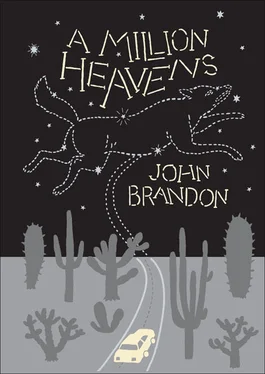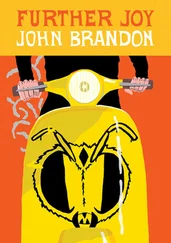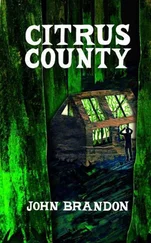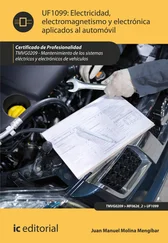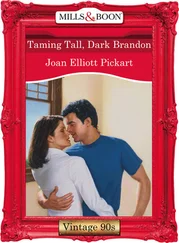Before Reggie had met Cecelia, he’d never imagined an audience for his songs, but in time he’d begun judging their quality purely by her reaction. She was adorable and admirable in a way that made Reggie long to protect her rather than exploit or impress her. Not that she needed much protection. She seemed to wish at times to be gullible and thoughtless, but she wasn’t. Reggie thought of her tiny pale feet curled up under her when she sat and played guitar. He thought of her sandpaper elbows. The way her face was somehow sharp and soft at once. He thought of their first meeting, at a concert held in the biggest auditorium on campus. About thirteen people had shown up. A woman with buzzed hair had played a deeply resonant wind instrument as tall as she was and a man with braids to his waist had accompanied her on xylophone. The two were married and both worked at a college on the West Coast. Their music sounded like it had been born deep in a mystical woodland. They were unfazed by the comically sparse crowd. They’d played three or four lengthy songs and then bowed and wheeled off their instruments. Reggie had noticed Cecelia during the show, sitting up straight and paying unwavering attention, a lock of hair wrapped around her finger, brow furrowed. When the show was over she remained in her seat and so did Reggie. He watched her as she kept gazing at the stage, empty now. Everyone had left the auditorium and Reggie felt like he would’ve waited all night for her to make a move and finally she gathered up her satchel and sweater and sidestepped into the aisle. Reggie hurried to get next to her and she wasn’t a bit startled by him. He told her his name and she said hers. When they got outside she handed Reggie her bag to carry and then he walked her toward the parking lot. There was a feeling that nothing had to happen, that they didn’t have to banter about the concert or identify things they had in common. They walked past the fountains in quiet, part of the hushed soundscape of the campus night, and when they reached Cecelia’s car Reggie handed over her bag and thanked her, not knowing what for, and she shook his hand but not like men shook hands — she took one of his whole hands in both of hers and just stood there with it a moment like she was going to tell him something about his future. Reggie was thinking he had to ask for her phone number but for some reason he couldn’t. He’d let her adjust her rearview mirror and back out and drive off. The next time he saw her was the first day of the next semester, in a class on early-twentieth-century painting. After class they had lunch together at a place with good stromboli and finally they talked and talked like old friends, breaking a long-standing silence between them, getting up for refills of soda and sipping on them deep into the afternoon.
Reggie thought of a night months after that, the only time he’d come close to kissing Cecelia. They’d been walking through the museum on campus, not paying attention to the art but enjoying the sequestered atmosphere, and a storm had rushed over Albuquerque and knocked out the power at the university. The backup lights had clicked on, barely bright enough to walk by, and Reggie and Cecelia had sat on the floor against a bench, the marble incredibly hard underneath them, feeling like the only two people in the world, or at least in the city, feeling safe in the cloistered caverns of the museum. Reggie had sensed his opening, sensed that at that moment Cecelia would have no grounds or strength to resist his advances.
Sitting on the bureau with this feet dangling down, Reggie felt relief for the first time since he’d died. He felt himself giving in.
He spent an entire day with Gee, and though he could tell he was enjoying himself there was nothing he could do about the feeling that anything that happened to him while his son was in a coma didn’t truly count. There could be no milestones, no further tragedy. That could’ve been why he was enjoying himself, he had to consider, not because he was so taken with Gee but because when he was with her reality was suspended. If Soren’s father was killing time, that wasn’t fair to Gee — if he was using her to speed along the dead stretch of time that would end only when Soren awakened. At the moment, though, he felt powerless against Gee. He wanted to see her, for whatever reason. He wanted to be around her. And anyway, he told himself, they’d met because she’d written a stranger a letter. They hadn’t even kissed yet. Soren’s father was analyzing things, which for someone unpracticed felt like overanalyzing, and maybe he was grateful to Gee even for that, for giving him a matter to overanalyze. Soren’s father was good at simple thinking, and his situation, simply thought of, was that time needed to be spent and some ways of spending time were preferable to others and Gee, well, she was pretty damn preferable.
They spent the whole day together and she took him to a studio she kept about halfway between Albuquerque and Santa Fe. The studio was farther from the clinic than the restaurant house had been, and maybe Gee was aware of that. Maybe she was expanding his range little by little. The studio was full of roadrunners Gee had made. They were mostly glass and had oversized heads and spindly legs that made them look like they were going to pitch forward. Gee said that was part of the art, the fact that whoever looked at them was forced to imagine a big crash and a floor full of shards to tiptoe around.
They went to an outdoor restaurant with a bunch of space heaters and Gee got Soren’s father to eat raw fish, tuna that had been cubed up and that you scooped with grainy crackers. Soren’s father was surprised Gee had convinced him to eat the tuna and more surprised that when she asked him how business was going, he came right out and told her. He told her that he’d lost a driver and didn’t have the pep to search for another one right now and so instead he was selling one of the trucks. He was going to lose part of his territory to a competitor.
Gee took a swig of some pomegranate juice she’d ordered and swallowed hard. “So you think you might lose the whole thing? The whole business, in time?”
Soren’s father guffawed. “Hadn’t thought that far ahead,” he said.
“Happens all the time. Lose one business, start another one. This is the United States.”
“Doesn’t happen all the time to me.”
“Maybe you and I are meant to throw in our lot together.” Gee let out a triumphant little laugh. “I have an idea for a restaurant I’ve been holding on to. Maybe I’ve been waiting for a partner. Maybe we’re supposed to change each others’ lives. Maybe a plan is underway that won’t be revealed until it’s complete.”
Soren’s father tried to look amused.
“I think you have more talents than you give yourself credit for,” Gee told him. “Might be time to use them. Maybe when Soren wakes up he’ll have an even better father than before.”
Soren’s father had no idea if Gee was serious about the restaurant idea. He did know he didn’t care for her suggesting he hadn’t always been the best person he could where Soren was concerned, the best possible example for his kid. That probably wasn’t how she’d meant it, though. She was concerned about him, was all. Soren’s father had no idea how well he knew Gee. He felt like a charmed snake, and like it must be for snakes, most of the charm resided in the charmer’s lack of fear. Soren’s father was only half-charmed, though. He wasn’t a healthy enough snake to get fully charmed. The sun was very bright and the heaters were close and low. Soren’s father reached for his water glass but all he had left was ice.
She did not wake her mother. Usually, on days Cecelia went to campus, she got up early in order to have time to get her mother up and out of bed. Her mother would argue against having the blinds opened. She would argue against the making of toast. When Cecelia left the house, she would do so dragging the fresh, oppressive knowledge that whatever she accomplished that day — wherever she went, whoever she met, whatever she learned — her mother was at home listlessly tossing feed out the back door, subsisting on crackers, listening to preachers.
Читать дальше
